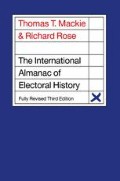Abstract
Nineteenth- and twentieth-century Spain has been marked by great institutional and political instability. The invasion of the country by Napoleon in 1808 was followed by the collapse of the ancien régime absolutism of the Bourbon monarchy. In 1810 a parliament (Cortes) indirectly elected by all heads of household aged over 25 met in Cadiz. This broad franchise, with the voting age reduced to 21, was confirmed in the constitution of 1812, which provided for a constitutional monarchy. In 1814 the exiled King Ferdinand VII returned and restored the absolute monarchy. In 1820 the king was forced to reinstate the 1812 constitution by the army, but he was able to restore royal absolutism three years later with the help of a French army.
Access this chapter
Tax calculation will be finalised at checkout
Purchases are for personal use only
Preview
Unable to display preview. Download preview PDF.
Sources
M. Cuadadro, Elecciones y Partidos Politicos de España, 1868–1931 (Madrid: Taurus 1969)
R. Gunther, G. Sani and G. Shabad, Spain after Franco: The Making of a Competitive Party System (Berkeley: University of California Press, 1986)
J. de Esteban and L. Lopez Guerrá, Las Elecciones Legislativas de 1 de Mario de 1979 (Madrid: Centro de Investigaciones Sociologicas, 1979)
J. Linz and J.M. de Miguel, ‘Hacia un analysis regional de las elecciones de 1936 en España’, Revista Española de la Opinión Publica 48, (1977)
J. Linz, ‘From great hopes to civil war: the breakdown of democracy in Spain’ in J. Linz and A. Stepan (eds.) The Breakdown of Democratic Regimes: Europe (Baltimore: Johns Hopkins University Press, 1978)
J. Linz, ‘The new Spanish party system’ in R. Rose (ed.) Political Participation (London and Beverly Hills: Sage 1980)
L. López Nieto and M.A. Ruiz de Azua, ‘La publicación oficial de los resultados electorales del 28 de octubre de 1982’ Revista Española de Investigaciones Sociologicas, 28 (1984) 245–264
Ministerio del Interior (n.d.) Elecciones Generales 1977 – 1979 – 1982 – 1986 Segun Actas Juntas Electorales Central y Provinciales — Resultados Congreso por Provincias
D. Nohlen, ‘Spanien’ in D. Sternberger and B. Vogel (eds.), Die Wahl der Parlamente Part 1: Europa (Berlin: de Gruyter, 1969)
H.R. Penniman and E. Mujal-Léon (eds.) Spain at the Polls, 1977 and 1979 (Washington, D.C.: American Enterprise Institute, 1985)
J. Santamaria, Los partidos politicos en España, second edition (Madrid: Centro de Investigaciones Sociologicas, 1989)
J. Tusell, Las Elecciones del Frente Popular (Madrid: Edicusa, 1971)
J. Tusell, Oligarquía y Caciquismo in Andalucia (1890–1923) (Barcelona: Editorial Planeta, 1976)
Author information
Authors and Affiliations
Copyright information
© 1991 Thomas T. Mackie and Richard Rose
About this chapter
Cite this chapter
Mackie, T.T., Rose, R. (1991). Spain. In: The International Almanac of Electoral History. Palgrave Macmillan, London. https://doi.org/10.1007/978-1-349-09851-4_21
Download citation
DOI: https://doi.org/10.1007/978-1-349-09851-4_21
Publisher Name: Palgrave Macmillan, London
Print ISBN: 978-1-349-09853-8
Online ISBN: 978-1-349-09851-4
eBook Packages: Palgrave Political & Intern. Studies CollectionPolitical Science and International Studies (R0)

